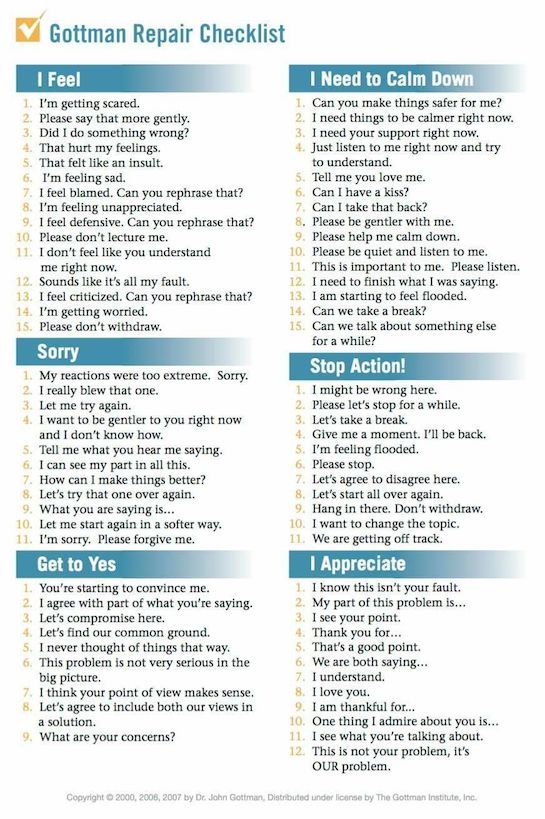When you think about it, every couple in every relationship is set up for failure. It’s impossible to be emotionally available to your partner 100% of the time. In his book, The Science of Trust, Dr. Gottman explains that both partners in a relationship are emotionally available only 9% of the time. This leaves 91% of our relationship ripe for miscommunication.
But failure is not the problem. Even a mother who failed to be responsive and available 50% of the time can raise a child to be a healthy adult with healthy relationships. The difference between “good mothers and bad mothers,” according to Donald Winnicott, “is not the commission of errors, but what they do with them.” How a child copes with everyday failures and fluctuations is directly related to the degree in which their parent creates an environment for a secure attachment bond and how that parent repairs their errors.
This is no different in our romantic relationships. The difference between happy couples and unhappy couples is not that happy couples don’t make mistakes. We all do. How couples repair is what separates the relationship Masters from the Disasters.
Repair is key to relationship success
No matter how careful you are, you will inevitably rupture the bond in your relationship. Even in a good marriage, couples:
- Have ugly screaming matches
- Say mean things to each other
- Get critical and defensive
- Engage in stonewalling
They do all the same things unhealthy couples do, but at some point they have a conversation where they recover from it. The difference between the Masters and the Disasters of relationships is the Masters repair their interactions effectively.
These couples are willing to admit responsibility for their part in the conflict so they can begin the process of healing their bond. They realize their relationship is more important than the problem.
The goal of repair is to understand what went wrong, and how to make your next conversation more constructive.
What makes a repair effective?
Dr. Gottman analyzed repair attempts in his Love Lab, asking the question: “How do people try to make things better?”
In the Gottman Repair Checklist, we give several examples of repair attempts, including:
After studying more than 3,000 couples, Dr. Gottman’s found that how a repair attempt was made did not necessarily predict the effectiveness of the repair attempt. Some people would make repair attempts in a beautiful way, and their partner just couldn’t hear it. Other couples made repair attempts in really clumsy ways and were successful.
In one study, Dr. Gottman observed a chemist and his wife talking about the nature of his work. The husband didn’t know exactly when he was coming home for dinner.
She said, “Well, the kids get hungry and they don’t want to start dinner without you so they get irritable and I have to put up with them.”
He said, “Why don’t you feed them a snack?”
His wife looks at him like, What do you think I am? A moron? Of course I gave them a snack.
When she did that, he realized he needed to make a repair, so he smiled with this grin. That was his repair attempt. This big, stupid grin.
And she started laughing. It was effective. It changed the way they were going into the negative downwards spiral.
Friendship is vital to good repair
It wasn’t until Dr. Gottman looked at the physiology of the partner receiving the repair that he uncovered the secret weapon of emotionally connected couples.
The real difference between the couples who repaired successfully and those who didn’t was the emotional climate between partners. In other words, your repair attempt is only going to work well if you have really been a good friend to them, especially lately.
Make positive deposits in your Emotional Bank Account by doing nice things and appreciating your partner. If you are understanding of each other, your relationship will be better fit to stand the inevitable storms that will come. If you are disrespectful, rude, and distant to each other, then your repair attempts will fail. It’s the quality of the friendship that matters most in repairing the relationship when things go wrong. Repairs don’t have to be well spoken or even complicated to be effective. Any genuine technique can work if a couple has the right foundation.
By focusing on the first three principles in The Seven Principles for Making Marriage Work, you can build a friendship that will make repair attempts — even a big, stupid grin — successful and keep your relationship on track.
Principle 1: Enhance your Love Maps
Get to know your partner’s world by asking questions and remembering the answers. Update your Love Maps as things change over time.
Principle 2: Nurture your fondness and admiration
Express your fondness and admiration for your partner by letting them know how much you love and care for them. Let them know you’re proud of them, compliment them, and thank them for all the things they do for you.
Principle 3: Turn toward each other instead of away
Respond to your partner’s bids for emotional connection and attention. Hold hands. Answer their questions. Ask their opinion. Laugh at their jokes. Make eye contact.
This article was originally published on Verily and edited here from its original version.











